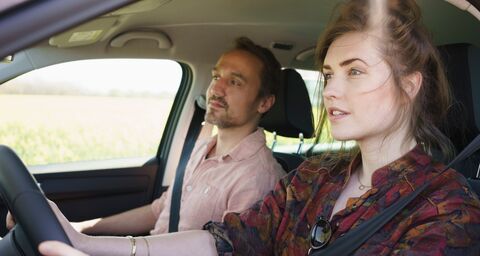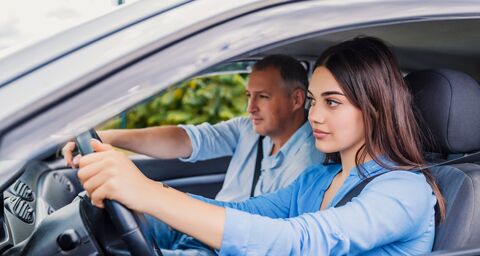
Tips for buying your first car
Buying your first car is very exciting, but can also be a little scary. You will probably have a lot of questions: What are the steps involved in buying a car? Where do I get insurance? How do I register my new vehicle? Here are some key tips for new drivers.
My first car! For many people a car is more than just a means to get from point A to point B. Cars convey a message. Cars are pure emotion. Or at least this is what the advertising will have us believe. And your gut feeling is also important when you choose a car. Because obviously you deserve to fully enjoy your car – especially when it’s your first. But if you want this initial happiness to last, you need to pay attention to certain things when you go out to buy a car.
Which car is best for me?
Something zippy for the city, rugged for offroading, or maybe a van or something larger? Take the time to find out what kind of vehicle is right for you. The answer depends on your needs, your budget and your personal situation. Why do you need a car and what will you use it for? How much car can you afford, factoring in both the purchase price and maintenance? Could your personal situation change in the near future? Planning a family, moving to a new house or changing jobs all strongly impact the kind of car you need.
The most important criteria for choosing a vehicle
Which features and options are a must for you and which are just nice to have?
- Number of seats: How many people do you want to be able to fit in your car?
- Doors: How many and what type of doors do you need?
- Cargo room: How much cargo space do you need? (Options: folding rear seats, roof box, trailer hitch)
- Driving terrain: Do you need a small maneuverable car for the city, a more robust vehicle for the country or all-wheel drive for the mountains?
- Type of engine: What makes the most sense for you – combustion engine (diesel is better for longer distances, gas for shorter trips), electric or hybrid?
- Transmission: Do you like to drive a standard or an automatic?
- Drive assist systems: Are you looking for comfort and safety or are you more interested in a reliable no-frills vehicle?
New or used?
Whether you want to buy straight out of the showroom or second hand is primarily a matter of price. Although it’s cheaper to buy a used car, there will be more maintenance and repairs to pay for.
- Used cars come with a statutory warranty of 12 months as long as nothing else is agreed in the contract.
- New vehicles carry a statutory warranty of 24 months. Some manufacturers offer an extended warranty of up to five years.
Before you purchase a used car, you should have it checked out by someone you trust who knows about cars. Ideally, they should go with you on the test drive. Pay attention to the overall impression you get from the car and check the vehicle maintenance log for regular maintenance. It’s best to buy a vehicle that has recently been inspected or serviced – or negotiate a better price if it hasn’t.
Buy or lease?
Leasing is a common option in Switzerland. About half of all the newly registered cars on Swiss roads belong to a leasing company. And yes, leasing can seem attractive – but it is also excessively expensive. You should read the fine print in a leasing contract very carefully.
Advantages of leasing
- Lower initial costs: Paying in installments is especially appealing to young people who haven’t had enough time to save up some money.
- New vehicles: As the car is unlikely to show signs of wear during the few short years you lease it, there is little risk of expensive repairs.
- Highly plannable: You pay fixed monthly installments that allow you to precisely plan your budget.
Disadvantages of leasing
- Higher costs: Over time, leasing is generally more expensive than buying. And no wonder since a third party is making money from the deal.
- Long-term obligations: If you lease a car, you are bound by a contract and constant payments, even if you suddenly no longer need the car.
- Strict contractual conditions The fees for damage, exceeding the mileage limits or terminating the contract early can be steep. You may be faced with large back payments when you return the lease.
What insurance do I need for my car?
Liability insurance
Mandatory motor vehicle liability insurance pays for any property damage or personal injuries you cause others with your vehicle. And without this certificate of insurance, you won’t be able to register your car.
Accidental damage insurance
Voluntary accidental damage insurance covers damage to your own vehicle. You can choose which financial risks you want to take on yourself and which ones you want to pass on to your insurer. The biggest decision you have to make is whether you want full accidental damage or partial accidental damage coverage. Full accidental damage covers all damage to your vehicle, even if you are at fault (collision insurance). Partial accidental damage insurance covers damage caused to your car by natural hazards, animals and unknown persons (see Infobox). Full accidental damage is worth getting if your car is new or in like-new condition. Generally once the car is six to eight years old, it has lost so much of its value that you’re better off with partial accidental damage.
Partial accidental damage coverage: Insured events
- Theft, including car hacking and misappropriation
- Glass breakage on windshield, side and rear windows
- Natural hazard events such as hail, fire or lightning strikes
- Damage caused by animals and by martens and rodents
- Malicious damage (e.g. deliberately broken off side view mirrors) excluding scratches
What does car insurance cost?
How much you pay for car insurance depends on several different things.
Vehicle:
- Vehicle model (list price, value of the vehicle)
- Annual mileage
- Storage (garage)
Driver:
- Personal information (age, gender, nationality)
- Number of years accident-free
- Choice of liability, partial or comprehensive accidental damage insurance
- Add-on coverage
How do I register my car?
Your new car is ready and you can hardly wait to get behind the wheel! All you need to do now is register it. Here’s what you need to do.
- Get several quotes from different insurance companies.
- Choose the one that fits your needs and purchase the policy .
- The insurance company will automatically send your certificate of insurance to the Road Traffic Office (RTO) in the canton where you live.
- The RTO will also want to see your certificate of residence and an official driver’s license , as well as an inspection report for new vehicles, or the last vehicle registration for a used car.
- The RTO will send you a new vehicle registration and a license plate .
How much will I have to pay for upkeep?
The cost of maintaining a car is made up of fixed costs and operating costs. The exact amount varies greatly from car to car, but in Switzerland, a rough estimate for yearly maintenance is around CHF 10,000 per vehicle.
Annual fixed costs:
- Leasing or loan costs if you went this route
- Parking space rental (at home and at work)
- Insurance premiums
- Motor vehicle taxes and duties
- Highway toll tag
Variable operating costs:
- Fuel
- Tires (replacing, changing, storing)
- Servicing and repairs
- Cleaning and care
- Parking tickets and fines
If you are not leasing: People often forget that depreciation should be figured into the cost of a car. In other words, your car is constantly losing value at a rate of about 10 percent a year – although it depreciates the most in the first year.








